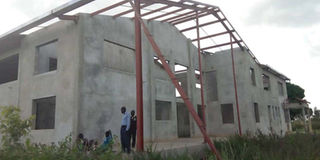Construction of Yumbe mango factory resumes

Under construction. The fruit processing factory that is yet to be completed in Yumbe District. PHOTO BY ROBERT ELEMA
The construction works on Yumbe Mango Processing Factory has resumed.
The project that started in 2015 and was to be completed in 2016 had stalled due to lack of funds.
The factory, with a production capacity of five metric tonnes per hour, will be processing mainly local mangoes.
Speaking to Daily Monitor yesterday, Ms Rose Ayikoru, a board member at National Agricultural Advisory Services (Naads) secretariat, said Yumbe District alone will not be able to support the factory with the mangoes given the huge market. All farmers in West Nile are being asked to grow enough mangoes to meet the market demand.
“We cannot rely on Yumbe alone for raw materials for the factory. Let us get organised and form cooperatives in all the districts in West Nile. So I request you (farmers) to form cooperatives, meet the quality of raw materials the factory needs,” she said.
She advised extension workers and Naads to organise farmers in cooperatives to help in adequate planning.
Mr Rashid Kawawa, the Yumbe production officer, said the construction works have been undertaken by Food and Nutrition Solution (FoNuS), a company owned by Makerere University lecturers from the school of Food Technology, Nutrition and Bioengineering.
“Such a factory cannot operate without a cooperative body but for Yumbe’s case, farmers have been mobilised to form cooperatives to manage it. The body will represent farmers’ issues including fixing the prices and flow of money from the factory to the farmers,” he said.
Mr Daniel Mabirizi, the monitoring and evaluation officer at the Naads secretariat, said the processing equipment has already been delivered to the site and it is only pending installation and commissioning that is expected for June.
He said they have similar interventions in provision of value addition equipment for fruit processing in Kayunga, Nakaseke, Nwoya, Soroti, and in greater Masaka Sub-region.
“Previously, somebody would export fruits up to Kenya, Rwanda but these factories are all within. It is an opportunity for us to access better markets for our produce,” he said.
He added: “The secretariat is on the process of developing guidelines to enable the beneficiaries improve management and utilisation of the facilities.”
He urged the district local governments to mobilise the farmers into appropriate and effective farm organisations and take the necessary technical, administrative and political follow-up and supervision to ensure effective use of the facilities.
Mr Kasim Sebbi, the chairperson for Lodonga sub-county, said: “The project will help farmers to process their mangoes, create employment opportunities, increase income status and increase local revenue base for the sub-county and the district.”




